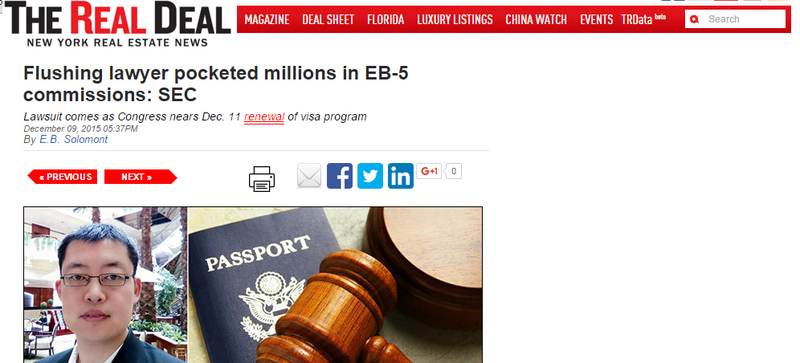Flushing lawyer pocketed millions in EB-5 commissions: SEC
Lawsuit comes as Congress nears Dec. 11 renewal of visa program
A Flushing lawyer pocketed more than $4 million in commission after illegally raising money from EB-5 investors in China, according to the Securities and Exchange Commission.
In a complaint filed Dec. 7 in a California federal court, the SEC alleged that attorney Hui Feng and his law firm, Feng & Associates, sold investments to Feng’s legal clients on behalf of several regional centers, the third-party entities that typically source and administer EB-5 investments.
The EB-5 program – popular among New York City developers and others – offers foreign investors a U.S. green card in exchange for a minimum investment of $500,000 in the U.S. economy.
The SEC alleges that Feng was not permitted to raise the funds since he is not a registered securities broker.
In several cases, the regulatory body also said Feng misled regional centers by directing commission payments to “overseas nominees” who sold the investments. “In reality, the commission recipients consisted of one of Feng’s friends, Feng’s relatives, and an entity Feng controlled, none of whom played any role in finding investors,” the complaint states. Feng began promoting EB-5 investment opportunities in 2010 and opened four law offices in China, none staffed with lawyers, federal regulators allege.
In all, Feng collected $4.3 million in commissions from the regional centers, federal authorities claim. Feng had clients sign retainer agreements, collecting $10,000 to $15,000 legal fees. The agreements didn’t disclose his commission payments, according to the complaint.
Feng, in a letter sent to TRD, strongly denied violating U.S. securities law. He said the regulatory agency is “harassing” him and others who are active in providing proper immigration services to Chinese clients.
The lawyer invoked victims of the Holocaust in his denial, quoting theologian Martin Niemoller’s famous poem, “First they came for the Communists.”
“Finally, [the] SEC came to me,” he wrote in the three-page letter. Feng said that the SEC is wrong because his clients are coming to the U.S. solely for the EB-5 program, and not “for profit.”
He’s in the process of setting up a legal defense fund to pay the legal fees associated with fighting the SEC lawsuit.
His case is one of seven suits filed this week by the SEC against attorneys accused of improperly brokering EB-5 deals.
The lawsuits come as Congress weighs changes to the popular – albeit controversial – EB-5 program.
The program, used as an investment vehicle for real estate projects in New York, is up for renewal on Dec. 11 Legislators are widely expected to enact changes that would increase oversight, including a possible increase on the minimum investment amounts, and targeted employment areas.
Developers like Related Cos., CIM Group and Silverstein Properties have stepped up their lobbying effort ahead of the Dec. 11 vote.
http://therealdeal.com/blog/2015/12/09/flushing-lawyer-pocketed-millions-in-eb-5-commissions-sec/
Mentions
- Gotham City Regional Center (Silverstein Properties Regional Center )
- Related Companies
- Hui Feng
- Law Offices of Feng & Associates
- UNITED STATES SECURITIES AND EXCHANGE COMMISSION
Litigation Cases
States
- California
Securities Disclaimer
This website is for informational purposes only and does not constitute an offer or solicitation to sell shares or securities. Any such offer or solicitation will be made only by means of an investment's confidential Offering Memorandum and in accordance with the terms of all applicable securities and other laws. This website does not constitute or form part of, and should not be construed as, any offer for sale or subscription of, or any invitation to offer to buy or subscribe for, any securities, nor should it or any part of it form the basis of, or be relied on in any connection with, any contract or commitment whatsoever. EB5Projects.com LLC and its affiliates expressly disclaim any and all responsibility for any direct or consequential loss or damage of any kind whatsoever arising directly or indirectly from: (i) reliance on any information contained in the website, (ii) any error, omission or inaccuracy in any such information or (iii) any action resulting therefrom.




